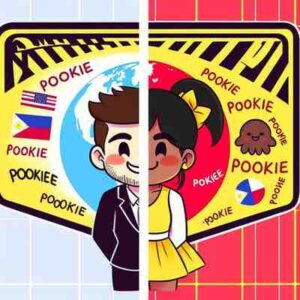Contents
Pookie’s: The Meaning, Origins, and Usages
In the vast realm of affectionate nicknames, “pookie” is increasingly emerging as the ideal and endearing term, utilized by a diverse range of people. When you’ve encountered it, whether in conversations, on social networks, or even in pop cultural contexts, “pookie” carries a distinctive warmth and closeness. This article discusses its meaning, history, and the various meanings of “pookie,” exploring its position in the world of language.

What Does Pookie Mean
“Pookie” is, at its core, an evocative phrase in love and affection. It bears a striking resemblance to charming names such as “honey,” “sweetheart,” or “darling.” People use it to describe someone or something adorable, cherished, and priceless in their hearts. The term often conveys emotions of warmth, closeness, and affection and is therefore a popular selection in the lives of couples, friends, and even relatives.
Origins of ‘Pookie’
The origins and meaning of “pookie” are not clear, however, since it appears to develop organically in the English language. Although there’s no definitive evidence of the historical or etymological origins that pinpoints its initial usage, “pookie” has found acceptance across diverse cultures and countries with time. It’s also made its way into mainstream media and further established its status in our current vernacular.

“Pookie” is used in various contexts.
1. Relationships:
In romantic relationships, “pookie” is often considered a pet name between lovers. It’s an expression of affection. It serves as a sign of affection and fosters a sense of friendship and adoration. One example is to make a thoughtful and touching greeting to their partner by saying, “Good morning, pookie.” The word helps to strengthen emotional bonds and adds some fun, affectionate nuances to conversations.
2. Social Media:
On popular platforms such as TikTok, Instagram, and Twitter, “What Does Pookie Mean” has grown in popularity as a phrase that refers to a person who is cute or enchanting. A user might make a comment about a cute video or photo, telling the world, “They’re just adorable!” This phrase’s popularity has led to widespread recognition and acclaim among younger generations, making it a popular feature in online interactions.
3. Pop Culture:
“Pookie” has also made its way into films, television shows, and music to highlight friendship between characters. For example, in the animated television show “Garfield,” the titular cat owns a favorite teddy bear named Pookie, which highlights the expression’s use in showing affection for treasured objects too.
4. Changes across various regions of culture
Although most people associate “pookie” with affection, it’s important to note that its meaning varies across different cultures and regions. “Pookie” can have a negative connotation in Filipino slang expressions. This highlights the importance of cultural context when it comes to affectionate words. This distinction emphasizes the richness and complexity of language, warning us to be aware of differences between regions.
There are numerous instances of “Pookies,” or “What Does Pookie Mean,” in use.
To demonstrate the versatility of “pookie,” here are several examples of its use in various settings:
Romantic Context: “I eagerly anticipate seeing you this evening,” Pookie said. I’ve missed you so much!”
Social Media: “Look at the puppy! It’s so adorable!”
Pop culture: In a sitcom, a character can say “Don’t worry, Pookie Bear, I’ve got your back” at their lover, which adds a comical and charming touch to their dialogue.
Conclusion
“Pookie” is one charming name of affection that integrates itself into the vocabulary of the English language, making it possible to convey affection and warmth. When utilized in the context of relationships, popular media, or contemporary culture, “pookie” evokes a sense of warmth and intimacy that resonates with a diverse range of people. Knowing the significance of its name, its history, and various meanings allows us to see the many facets associated with this name and its significance in creating connections and spreading love.